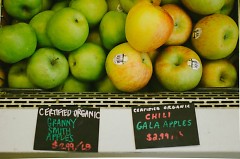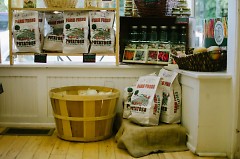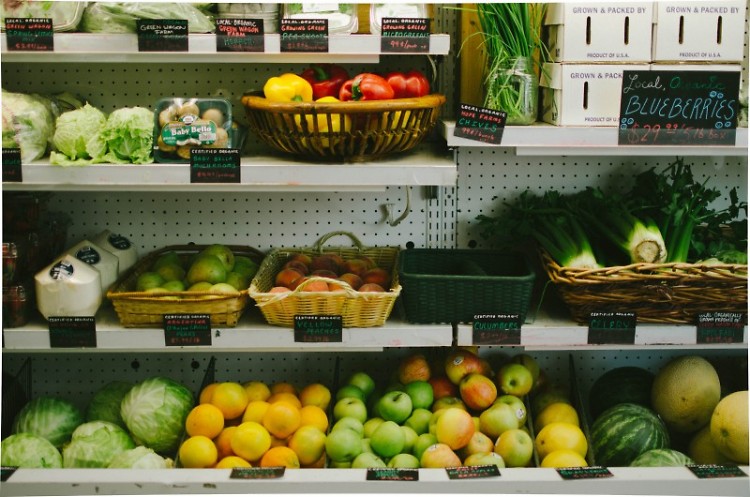Nourish Organic Market is conveniently located mere blocks away from where I live, so when I needed some potatoes and a tomato to make dinner one evening, I just took a walk. I picked out my items—not paying attention to their prices because I was in it for the convenience. I was also preoccupied with how quaint and morally just I was feeling. I had just walked to a locally owned store to buy groceries and I was buying organic. I felt really good about it.
At least I did, until the cashier rang up my items on her cash register and told me my total was somewhere around ten dollars. For one tomato and a five-pound bag of potatoes. What?
When I got home and started preparing my meal, I noted the superior quality of the produce. Meijer-bought tomatoes don’t hold a candle to organic tomatoes. Still, how could I justify spending that much more on food on a regular basis? Why would I bother when Meijer’s produce is exponentially more affordable? Why is organic food so expensive, anyway?
The price tags on organic foods have long been a source of public scrutiny. And of course, scrutiny is always welcome—generally, it’s good to know where your food comes from and whether or not it’s worth what you’re being charged for it. When it comes to locally grown organic food, high prices reflect the higher costs of small-scale organic farming. By some peoples’ standards, those prices could even stand to go up.
"Produce, if it's grown organically, is way more difficult to grow," says Sheri Rop, owner of Nourish Organic Market. "Human labor, time, patience—all this costs money."
Certified organic farming is inherently more labor intensive. Not using chemicals for pest and weed control means you have to have more hands on deck removing pests and weeds from the crops. Then, because this tends to be less effective than just spraying chemicals, organic farmers have to compensate for larger crop losses.
"A big proportion of our budget is labor," says Katie Brandt, co-owner of Groundswell Community Farm, a CSA located in Zeeland.
Groundswell keeps open books. Of their yearly budget of $190,000, Brandt says that about $70,000 of that goes to workers. That’s nearly 40 percent.
Groundswell strives to pay all of its workers at least minimum wage. Some of its farm employees make more per hour than Brandt and her husband, Tom Brandt, do. Katie Brandt works full time and Tom Brandt works part time. Together, they make a total of $20,000 a year.
They aren’t alone. During the winter of 2014, Lance Kraai of New City Urban Farm analyzed data provided to him by seven local farmers who agreed to open their books to see how things added up. Kraai found that on average—with all income considered, including loan payments, insurance, etc.—farm workers make $6.66 per hour, a number egregiously (and demonically, Kraai jokes) lower than Michigan’s $8.15 minimum wage requirement.
At the end of the year, Kraai says, many organic farmers consider themselves successful as long as they break even.
These remarkably low wages reveal organic farming’s economic shortcomings. It’s a labor-intensive, costly and, right now, comparatively inefficient way to produce food. For organic farming to provide a more sustainable living, prices should increase, but that doesn’t look like a plausible solution.
"There isn't really a lot of room for prices to go up," says Kraai. "I mean, the customer's going to balk at that."
When organic produce is already often twice as expensive as conventional produce, raising prices even more understandably raises eyebrows. But it begs the question: why is our threshold for spending on food as low as it is?
"Our idea of what is reasonable to spend on food is not reasonable," says Rop.
Rop believes that part of the explanation is that prices on non-organically grown crops and commodity crops don’t necessarily reflect what they cost to grow. Government subsidies on commodity crops like corn and wheat make producing foods that use them incredibly cheap. It comes as no surprise, then, that 75 percent of the food you find in any given grocery store is made with corn. Corn by itself isn’t terribly unhealthy, but it has, some studies argue, inadvertently created a glut of highly processed, cheaply made and nutritionally valueless foods. Effectively, the government—which, Rop wryly acknowledges, “is us”—is subsidizing our consumption of junk food. The result is that our expectations for what food should cost are unrealistically low, and that may color the way we spend our money.
Rop doesn’t understand why people who can afford to buy healthy, ethically grown food would sooner buy cheap food that is nutritionally valueless and, in many cases, harmful to their health.
"Quality just costs more," says Rop, "and why we wouldn't think that's an okay deal when it comes to food and our bodies is really frustrating to me."
"We take this lowest thing as a standard, and we don't do that in any other area of life," she says. "Are you going to get a crappy phone for 19 bucks or are you going to pay 600 dollars for quality?"
Rop realizes that for some people, spending more money on food isn’t so easy. Low-income families don’t necessarily have the luxuries of time and money to spend on acquiring organic foods and cooking with them. Farmers acknowledge this too. CSAs like Groundswell offer discounts on their memberships for people who qualify for food assistance. Many local organic farms and markets participate in Double Up Food Bucks, a program which also helps to reduce the costs of healthy food for low income families. Rop believes education about what’s in the food we eat and how to cook should also be made more readily available to lower income families, and farms try to provide this as well.
Overall, Rachelle Bostwick of Earthkeeper Farm says, if they can put the effort in, anybody can eat more organic fruits and vegetables, regardless of income level.
"It does require a certain level of resourcefulness, but if you look for those options, they're out there," she says. "But it takes some initiative."
Right now, organic farms like Groundswell, Earthkeeper and New City Urban Farm and organic markets like Nourish are there for people who value what organic farming stands for.
"[Our customers] understand there's a lot that goes into producing their food, and that in order for us to make a living and continue being farmers—and respect the earth and respect our workers and pay the actual costs of producing food—that it does require a higher premium at the end," says Bostwick.
At present, organic farming in Grand Rapids isn’t a lucrative profession. It doesn’t operate with the intent of amassing large profits. It is entirely fueled by farmers and consumers who fervently believe that organic produce and products are better for human health and the environment.
"The industrial food system is bound for collapse. It's self-destructing. It's based on poison and exploitation and depletion of natural resources," says Bostwick. "There's no way it can continue in the way that it is."
"When you spray a poison that kills most of the bugs, the ones that survive reproduce. You can see now that they're using higher levels of chemicals, higher concentrations, more and more weed killers that aren't as effective. It's an arms race with nature that we're going to lose, and along the way we're killing ourselves," Bostwick pauses. "What was the original question?"
I remind her that I asked if she thought that more people should support organically grown food.
"Damn straight," she says.
As local organic growers expand, they seek ways to reduce costs on their end—working to make their processes more efficient. Kraai also hopes organic farmers will focus their energies on markets where they know they can make a better profit on their sales. Some will go bankrupt, some will persevere.
"The depressing thing is thinking that it might just be like a hobby," Kraai says of organic farming being a sustainable source of income. He cites other vendors at farmers markets who sell things like "knitted vests"—people who are clearly there to merely supplement their income, or even just make a little cash off of their hobby.
"Is that what organic growing is? Is it just like this artisan hobby thing? Or can it be a business?"
The Rapidian, a program of the 501(c)3 nonprofit Community Media Center, relies on the community’s support to help cover the cost of training reporters and publishing content.
We need your help.
If each of our readers and content creators who values this community platform help support its creation and maintenance, The Rapidian can continue to educate and facilitate a conversation around issues for years to come.
Please support The Rapidian and make a contribution today.


